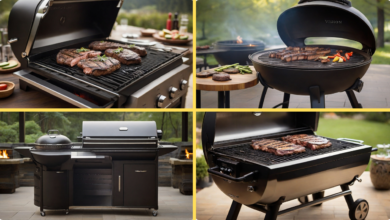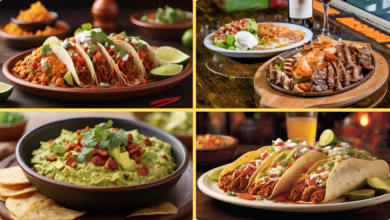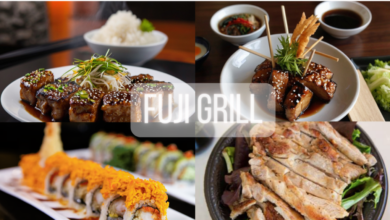Grill Your Thanksgiving Turkey to Perfection: A Step-by-Step Guide [With Statistics and Tips]
![Grill Your Thanksgiving Turkey to Perfection: A Step-by-Step Guide [With Statistics and Tips] 1](https://thegrillshopboyertown.com/wp-content/uploads/2023/04/tamlier_unsplash_Grill-Your-Thanksgiving-Turkey-to-Perfection-3A-A-Step-by-Step-Guide--5BWith-Statistics-and-Tips-5D_1681263207.webp)
## Short answer: How do you cook a turkey on the grill?
To cook a turkey on the grill, prepare it by removing giblets and rinsing it. Season as desired, then place on a preheated grill over indirect heat. Cook for about 15 minutes per pound until internal temperature reaches 165°F. Cover with foil and let rest for 20 minutes before carving.
The Ultimate FAQ: Answers to Your Burning Questions about Cooking Turkey on the Grill
Ah, the age-old question: can you cook a turkey on the grill? The answer is a resounding YES! In fact, cooking a turkey on the grill is gaining in popularity due to its moist and flavorful results. But before you fire up your grill and toss that bird on, let’s go over some FAQs about grilling turkey.
Q: What type of grill should I use?
A: Any type of grill will work – gas, charcoal, or even wood pellet. Just make sure it’s large enough to accommodate your bird.
Q: Can I stuff the turkey for grilling?
A: Unfortunately, no. Stuffing can increase cooking time and temperature variations, leading to an unevenly cooked bird. You can always make stuffing separately on the stovetop or in the oven.
Q: Do I need to marinate my turkey before grilling?
A: It’s not necessary but highly recommended for added flavor and moisture retention. Marinades can be as simple as oil and herbs or more complex with fruit juices and spices.
Q: How do I prepare my grill?
A: Preheat your grill to around 350°F – 400°F before placing your bird on indirect heat (meaning not directly over the flames). Also, make sure to clean your grates thoroughly beforehand.
Q: How long should I expect my turkey to take to cook?
A: As a general rule of thumb, it takes about 13-15 minutes per pound at 350°F. However, this may vary depending on factors such as outside air temperature and wind conditions.
Q: How do I know when my turkey is done?
A: The best way to determine if your turkey is safe to eat is by using a meat thermometer inserted into the thickest part of the breast and thighs. The internal temperature should read at least 165°F.
Q: Can I baste my turkey while it’s grilling?
A: Basting can add extra flavor and moisture to your turkey, but it’s vital not to open the grill‘s lid too frequently. Every time you lift the lid, heat escapes from your grill, which adds cooking time.
Q: Do I need to rest my turkey after grilling?
A: Absolutely! Letting the bird rest for at least 20 minutes before carving allows the juices to redistribute, resulting in a juicier and tastier turkey.
Now that you’re armed with all this knowledge, go forth and grill that turkey like a pro. Happy grilling!
Grilling vs. Roasting a Turkey: Pros and Cons
Cooking a turkey for the holidays is a time-honored tradition, but there are different methods for cooking it. Two popular options are grilling and roasting, with each method having its pros and cons.
Grilling Turkey: Pros and Cons
Pros:
1. Flavor – Grilling imparts a smoky flavor to the meat that cannot be replicated in an oven.
2. Crispy Skin – The high heat from the grill results in crispy skin, which many people find irresistible.
3. Time Saver – Depending on the size of the turkey, grilling can take as little as two hours—much less than traditional roasting times.
Cons:
1. Inconsistent Heat – It can be challenging to maintain consistent heat on a grill, especially when cooking large birds like turkeys.
2. Limited Space – Many grills may not have enough surface area for accommodating larger birds.
3. Safety Considerations – There is an increased risk of fire hazards when dealing with open flames and hot coals.
Roasting Turkey: Pros and Cons
Pros:
1. Consistent Heat – Cooking in an oven means you don’t have to worry about fluctuations in temperature or flare-ups that can impact your cook time.
2. Ease of Use – Most ovens have timers and automatic shut-off functions that make cooking easier by allowing you to set-it-and-forget-it.
3. Versatility- Roasting allows you to create different textures like tender white meat or juicy dark meat by controlling temperature.
Cons:
1. Moisture Loss – Oven cooking can result in dryness if not monitored closely or if cooked at too high temperatures
2. No Smoky Flavor- Unlike grilling, roasted meats do not benefit from adding smoky flavor profiles unless using smoker attachments
3. Oven Dependents- In the event there’s no working oven during holidays (been there) will require alternative methods such as alternate kitchen appliance or take-out.
In conclusion, both grilling and roasting offer unique benefits and drawbacks. Choosing one method over the other may depend on factors such as personal preference, desired flavor profile, equipment availability, and time commitment. So next time you’re planning a holiday feast, consider these pros and cons to decide which cooking method suits you best for a perfect turkey!
Top 5 Tips for Achieving Juicy, Perfectly Cooked Turkey on the Grill
When it comes to grilling, there’s no better way to impress your guests than by serving up a perfectly cooked turkey. The challenge is that cooking turkey on the grill can be tricky – from getting the right temperature to ensuring the meat stays juicy and flavorful. But fear not, because we’ve got you covered! Here are our top 5 tips for achieving juicy, perfectly cooked turkey on the grill:
1. Marinate
One of the best ways to add flavor and moisture to your turkey is by marinating it overnight. Whether you opt for a sweet and spicy marinade or a simple citrus one, letting it soak in these flavors will help tenderize the meat and keep it juicy.
2. Preheat Your Grill
When heat meets raw meat, a magical thing happens – caramelization! But this only occurs if your grill is preheated properly. Make sure you turn on all burners or light charcoal at least 30 minutes before tossing your turkey onto the grill.
3. Use Indirect Heat
Turkey needs to cook slowly and evenly over low heat so that it cooks through without drying out. Grilling using indirect heat means placing coals on one side of the grill, leaving space on the other side for your bird to cook slowly via convection air flow.
4. Use a Meat Thermometer
To ensure perfect cooking of your turkey, use a meat thermometer before turning off heat or opening up foil cover as metal utensils provided with cooker are not always reliable his means poking into thickest part of thigh and making sure temperature reaches at least 155-160 F) while using foil or in closed container).
5. Give It Rest Time
Once your turkey reaches its perfect temperature (165°F), allow resting for AT LEAST 20-30 mins so juices settle thus keeping them intact making slicing easier from presentation point of view too one can cut down easily depending upon number of people being served.
By following these tips, you’ll be able to achieve juicy and perfectly cooked turkey on the grill – guaranteed to wow any crowd. And when it comes to serving up a delicious meal, isn’t that what grilling is all about?
Essential Tools and Equipment You Need for Grilling a Turkey Like a Pro
When it comes to cooking up a delicious and succulent turkey, grilling is an excellent way to go. The open flame not only adds a smoky flavor, but also creates crispy brown skin that locks in juices and delivers delectable aroma that will excite your tastebuds.
However, grilling a turkey requires specific tools and equipment to ensure success. Here are some essential items you need to have on hand for grilling a turkey like a pro:
1. Grill – Of course, you’ll need a grill! A charcoal grill or gas grill will do the trick as long as it’s large enough for your bird.
2. Meat Thermometer – Despite what you might think, cooking time can vary based on numerous factors (including temperature) when it comes to grilling a turkey. Using an instant-read thermometer with accurate temperature readings is essential so you can ensure your turkey isn’t over- or under-cooked.
3. Meat Injector – To really take your bird to the next level, inject some flavorful marinade into the meat before cooking using a meat injector.
4. Basting Brush – Adding flavor throughout the grilling process is crucial for taste buds seeking perfection. Use silicone basting brush to safely add butter or seasoning during cooking without melting onto hot parts of the grill.
5. Grilling Planks – Grilled turkeys would reach another level of texture by using cedar planks while smoking in direct flames adding nice earthy notes .
6. Poultry Shears- Trimming off bones from the cooked poultry meat after roasting will be beyond easy if you have this special scissor made specifically for poultry usage.
7. Heat Resistant Gloves – Grilling means working with open flames which could result in serious burns when handled carelessly , investing in heat resistant gloves reduce chances of burnt fingers
By having these tools at hand when grilling your Thanksgiving Turkey , we assure flawless turkey worthy of five stars on presentation and flavour scale .Not only will your culinary skills impress your family and friends, but each bite of succulent turkey will transport them in to a world of cooking redefined!
Let’s Talk Flavor: Unique Marinades and Rubs for Grilled Turkey
Grilled turkey is a delicious option for outdoor barbecues and gatherings, but it can become a bit monotonous without variation in flavor. Thankfully, there are plenty of unique marinades and rubs that can add some excitement to your next grilled turkey feast.
One popular option is a citrus marinade. This zesty marinade typically consists of fresh lemon or lime juice mixed with olive oil, minced garlic, and an herb such as thyme or rosemary. The acidity from the citrus helps break down the meat fibers, making it more tender while adding brightness to its flavor profile.
Another fun twist on traditional flavors is a spicy rub consisting of paprika, chili powder, cumin, garlic powder and dried oregano. This classic blend pairs great with poultry and produces smoky flavor notes reminiscent of those found in Southern barbecue cuisine.
For those who prefer something sweeter and tangy in taste should try out a teriyaki marinade. This Japanese-inspired concoction is made with soy sauce, brown sugar or honey, fresh ginger root, garlic and dry white wine which gives a sweet yet savory base to the turkey along with touch of umami flavor.
Alternatively for people who enjoy Hispanic flavors such as Mojo criollo which translates directly into “garlic sauce” could be perfect option.Here we mix bitter orange juice (using any mild vinegar can also work well) , minced garlic cloves ,olive oil together resulting in tangy-tart-slightly rare syrupy marinade blend that will take your bird’s flavor game to next level
When choosing between herbs and spices for turkey seasoning,pick ones that suit personal taste profie (for eg.-rosemary pairs great with Lemon Pepper Marinade ) By introducing nutty flavors like cumin you might destroy delicate balance.While rosemary complements many seasonings both pair exceptionally well together if used judiciously .
In addition to traditional seasoning combinations ,you may choose innovative/new ideas prevalent nowadays by blending out-of-the-box ingredients together, like Apple Butter BBQ Sauce, Pineapple Teriyaki marinade or even a Bourbon Honey glaze to give that perfect kick of flavor.
Above all, it comes down to personal preference when choosing what marinades and rubs will work for grilled turkey. So, this grilling season forget about boring turkey than can put your guests into dullness instead experiment with different combinations of flavors & make the perfect Grilled Turkey that leaves an exceptional in mouth experience for one and all!
Common Mistakes to Avoid When Grilling a Turkey – And How to Fix Them!
Turkey grilling is an art that requires mastery, but it’s not as easy as it looks. There are many mistakes to avoid while grilling a turkey to ensure that it comes out succulent, tasty, and healthy. This guide will be discussing the most common missteps when grilling turkey and how you can fix them.
Mistake #1: Not Preparing the Turkey Adequately
One of the most significant errors you could make when grilling a turkey is not preparing it professionally. The key here is to have your turkey marinated in your preferred marinade or brined for at least 12-24 hours before loading it onto the grill. This helps season the meat inside out, allowing flavors to penetrate deeply into every corner.
To help shorten cooking time and minimize dryness, spatchcocking (cutting open the underside of the backbone of the bird) may come in handy. Do not forget to pat dry your bird after marinading or brining before cooking starts.
Mistake #2: Not Thawing Your Turkey Appropriately
Thawing your bird overnight on the kitchen counter is an invitation for disaster! Doing so can allow harmful bacteria such as salmonella growth engulf it leading to food-borne illnesses; thus, thaw accordingly:
– Keep refrigerated below 40°F
– Submerge turkey in cold water for half-hour per pound
– Microwave on defrost mode (if possible)
– No matter what method you use, transfer immediately to grill post-thawing.
Mistake #3: Cooking Your Turkey on Too High Heat
Grilling poultry needs low and slow heat – otherwise referred to as indirect grilling – where you place your bird bone down alongside hot coals or burners with no direct heat on top. If cooked using high heat only from above results in its outer skin burning even before its internal temperature reaches the minimum recommended safe temperature level of 165°F. Use an instant-read thermometer to check the turkey’s temperature often.
Mistake #4: Opening the Grill Too Often
Yes, we know you’re excited to see how it’s coming along but holding up the grill cover halts progress unnecessarily allowing heat that has taken time to establish release before filling again. This rush and halt slow down grilling and cause temperature fluctuation leading to dry chicken instead of perfectly grilled bird. Hold off on frequent grilling peeks!
Mistake #5: Applying BBQ sauce too soon
Like most meats, your turkey needs ample time to get as crispy, charred or smoky (depending on what you prefer) as possible; therefore, slathering BBQ sauce early in the cooking process could ruin this. Sugar found in most sauces results in regularity burning onto food if cooked for too long; 15-20 minutes before consummation is recommended when adding barbecue sauce.
By implementing these adjustments while avoiding the above mistakes, you will impress whoever’s eagerly waiting with a healthier juicy grilled bird that everyone will not only eat but crave for!
Table with useful data:
| Ingredients | Instructions |
|---|---|
| 10-12 lb turkey | 1. Preheat your grill to medium heat. |
| 1/2 cup olive oil | 2. Rub the turkey with olive oil and seasonings of your choice. |
| Salt and pepper to taste | 3. Place the turkey on the grill over indirect heat. |
| 2-3 cups wood chips (apple or hickory) | 4. Add wood chips to the grill for a smoky flavor. |
| Meat thermometer | 5. Close the lid and cook the turkey until it reaches an internal temperature of 165°F in the thickest part of the meat. |
| Aluminum foil | 6. Let the turkey rest for 15-20 minutes before slicing and serving. |
Information from an Expert
When it comes to cooking a turkey on the grill, the key is to keep the temperature low and slow. First, brine your turkey for at least 12 hours before grilling. Preheat your grill to medium heat and place a drip pan underneath the grill grates. Place the turkey on the grill over indirect heat, breast-side up. Cover and cook for about 2-3 hours until the internal temperature reaches 165°F in the thickest part of the bird. Add wood chips or herbs to add extra flavor while cooking. Allow the turkey to rest for at least 15 minutes after removing it from the grill before carving and serving.
Historical fact:
Grilling turkey dates back to the Native Americans, who used green wood and hot coals in a pit to cook whole turkeys during cooking festivals. It wasn’t until the early 20th century that grills became widely available for home use and more people started experimenting with outdoor turkey cooking methods.



